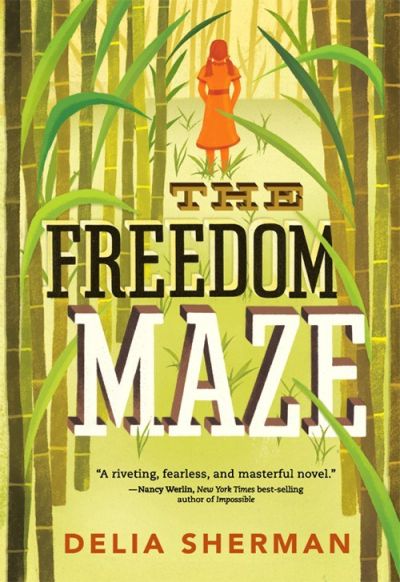Lose Your Way
The Freedom Maze
By Delia Sherman

23 Mar, 2023
Delia Sherman’s 2011 The Freedom Maze is a stand-alone young-adult time travel novel.
1960: Young Sophie Martineau is dragged by her mother, fleeing the embarrassment of divorce, to Oak Cottage in Louisiana. Oak Cottage is a last remnant of lost Fairchild wealth, which has dramatically dwindled after a century of setbacks. Sophie is not pleased to be spending her summer there with her maternal relatives.
Seeking escape from her grandmother’s nostalgic tales of “the good old days before the war of northern aggression,” uncomfortable hearing about adult disquiet over desegregated schools, Sophie explores the land around Oak Cottage. She makes a momentous discovery with extraordinary consequences.
The being Sophie encounters in the old garden maze is known to humans by many names, none of which it admits to being its true name. It can grant Sophie a wish. Foolishly, Sophie accepts the gift. Sophie escapes from 1960 to the bucolic utopia of 1860.
Sophie discovers almost immediately that 1860 is unpleasant in general and very unpleasant for her. Upon encountering the Fairchilds of the 1860s she discovers they are not at all friendly to mysterious visitors. Indeed, on seeing Sophie’s well-tanned skin and curly hair, they assume that she must be a slave.
Sophie’s family resemblance to the Fairchilds convinces them that she must be Robert Fairchild’s slave, sent to the estate by Mr. Robert. This is the sort of thing he would do, sending a slave alone. No papers? She must have lost them. Her family resemblance to Robert is noted but not spoken out loud. Masters who father children on slaves were all too common in this place and time.
Sophie is immediately put to work. She finds that being a slave in the old South is quite unlike the ante-bellum utopia her grandmother has imagined. There seems no way out. Escape to the North is risky. Return to 1960 seems impossible.
~oOo~
“Won’t the Civil War be along soon enough?” It will but the impact on the plantation, while beneficial to the slaves in the long run, involves violence that a young girl might not survive unscarred. Or at all.
The text makes it clear that the division of a mixed population (a whole lot of gene-mixing going on) into white and black is entirely arbitrary, that where one falls is a matter of chance and prejudice. As the Fairchilds themselves admit, a number of their slaves would be taken for white, if one didn’t know their history.
A minor spoiler: the Fairchild assumption that Sophie must be black isn’t that far off the mark. It takes Sophie the length of the book to put together the carefully hidden elements of the family history between 1860 and 1960. As she learns, sometimes people who take particular pride in their lineage do so because they have willfully erased important parts of it.
The obvious comparison here is Octavia E. Butler’s Kindred. The Freedom Maze eschews discussing explicitly subjects like rape, although there are allusions to it. While Sherman makes clear that the lot of the slave is unpleasant (unending labour, harsh punishments, violent reprisal against escapees), her effectively written novel is not nearly as brutal as Butler’s. But then, it is aimed at younger readers.
This is the second time I’ve read The Freedom Maze. The first was as a juror for what is now called The Otherwise Award. I enjoyed it more the second time than the first. The similarities between it and Kindred didn’t press on me so much.
If there’s one thing the last decade has shown us, it’s that nostalgia for white supremacy is alive and well and that there is lots of room for novels that shine a spotlight on the unpleasant consequences of this mindset.
The Freedom Maze is available here (Amazon US), here (Amazon Canada), here (Amazon UK), here (Barnes & Noble), here (Book Depository), and here (Chapters-Indigo).
